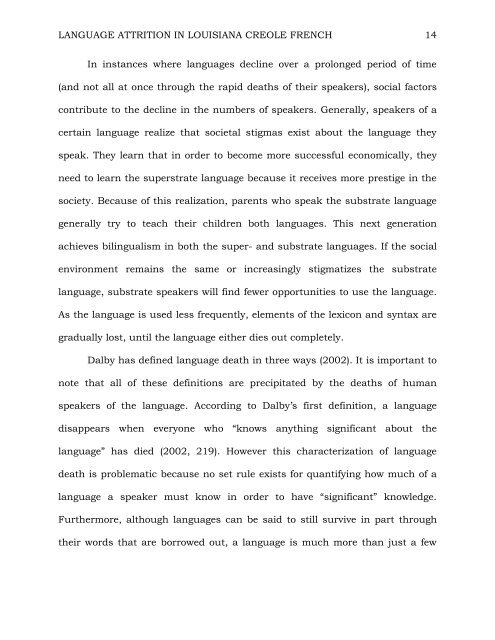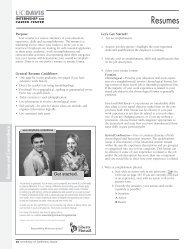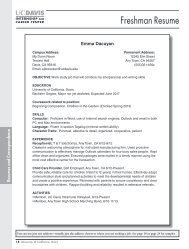Language Attrition in Louisiana Creole French
Language Attrition in Louisiana Creole French
Language Attrition in Louisiana Creole French
Create successful ePaper yourself
Turn your PDF publications into a flip-book with our unique Google optimized e-Paper software.
LANGUAGE ATTRITION IN LOUISIANA CREOLE FRENCH 14<br />
In <strong>in</strong>stances where languages decl<strong>in</strong>e over a prolonged period of time<br />
(and not all at once through the rapid deaths of their speakers), social factors<br />
contribute to the decl<strong>in</strong>e <strong>in</strong> the numbers of speakers. Generally, speakers of a<br />
certa<strong>in</strong> language realize that societal stigmas exist about the language they<br />
speak. They learn that <strong>in</strong> order to become more successful economically, they<br />
need to learn the superstrate language because it receives more prestige <strong>in</strong> the<br />
society. Because of this realization, parents who speak the substrate language<br />
generally try to teach their children both languages. This next generation<br />
achieves bil<strong>in</strong>gualism <strong>in</strong> both the super- and substrate languages. If the social<br />
environment rema<strong>in</strong>s the same or <strong>in</strong>creas<strong>in</strong>gly stigmatizes the substrate<br />
language, substrate speakers will f<strong>in</strong>d fewer opportunities to use the language.<br />
As the language is used less frequently, elements of the lexicon and syntax are<br />
gradually lost, until the language either dies out completely.<br />
Dalby has def<strong>in</strong>ed language death <strong>in</strong> three ways (2002). It is important to<br />
note that all of these def<strong>in</strong>itions are precipitated by the deaths of human<br />
speakers of the language. Accord<strong>in</strong>g to Dalby‟s first def<strong>in</strong>ition, a language<br />
disappears when everyone who “knows anyth<strong>in</strong>g significant about the<br />
language” has died (2002, 219). However this characterization of language<br />
death is problematic because no set rule exists for quantify<strong>in</strong>g how much of a<br />
language a speaker must know <strong>in</strong> order to have “significant” knowledge.<br />
Furthermore, although languages can be said to still survive <strong>in</strong> part through<br />
their words that are borrowed out, a language is much more than just a few
















